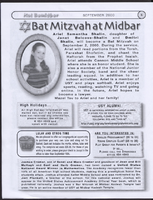Search the Special Collections and Archives Portal
Search Results
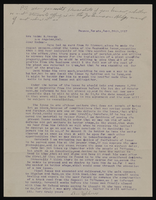
Correspondence, Levi Syphus to Sadie George
Date
Archival Collection
Description
Text
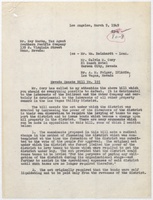
Letter from E. E. Bennett (Los Angeles) to Ray Marks (Reno) regarding Nevada Senate Bill 155, March 9, 1949
Date
Archival Collection
Description
Letter from Bennett calling attention to Nevada Senate Bill No. 155. Senate Bill 155 gives the Las Vegas Valley Water District power in levying taxes and issuing bonds in ways contrary to its original act. According to Bennett, it would create an unfair tax burden on the Los Angeles & Salt Lake Railroad Company and should be defeated. Senate Bill 155 is referenced below.
Text
Audio clip from interview with Lovee duBoef Arum by Barbara Tabach, November 1, 2016
Date
Archival Collection
Description
Part of an interview with Lovee duBoef Arum on November 1, 2016. In this clip, Arum discusses her childhood, family life, and what brought her to Las Vegas.
Sound

Patricia Vazquez interview, November 14, 2018, June 14, 2019: transcript
Date
Archival Collection
Description
Session 1: Interviewed by Marcela Rodriguez-Campo. Barbara Tabach also participates in the questioning. Session 2: Interviewed by Rodrigo Vazquez. Monserrath Hernandez also participates in the questioning. Patricia Vazquez was born and raised in Las Vegas, NV and shares her experiences growing up in the Valley as a Queer Latina. At a young age, she remembers traveling back and forth between Mexico and the U.S. to visit family. When she started school she shares how her home language, Spanish, became her family's "secret language" as she began to learn English. During elementary school Patricia was tracked into the special education program, and remove from the mainstream classroom. She would find her love for learning in books and libraries as she taught herself how to read in English. Despite being tracked into less advanced courses, Patricia would end up taking AP/ Honors courses in high school after forging her favorite teachers signature, which changed her educational trajectory. After coming out to her family, Patricia went nearly a decade distanced from her mother and continued her college education at Arizona State University. There, she would complete a bachelors in painting and a masters in comparative literature. Her work with the Chicano Studies program at ASU helped her develop her Chicana identity and begin her involvement in social activism. In Las Vegas, she worked to fight for marriage equality and LGBTQ rights with the American Civil Liberties Union , and later with the Progressive Leadership Alliance of Nevada. She also conducted several lectures for the Latino Youth Leadership Conference on sexuality, gender, and homophobia for over a decade. She has served as an English Professor at the College of Southern Nevada for the last 20 years and is an avid hiker, traveler, and painter.
Text

Interview with Edward Bonfoy Giller, April 19, 2006
Date
Archival Collection
Description
Text
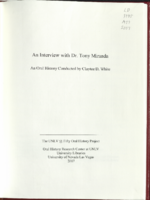
Transcript of interview with Dr. Tony Miranda by Claytee D. White, July 24, 2006
Date
Archival Collection
Description
Text
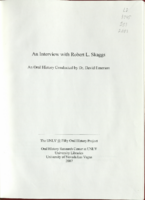
Transcript of interview with Robert L. Skaggs by Dr. David Emerson, May 06, 2006
Date
Archival Collection
Description
Text
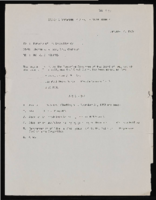
Economic Opportunity Board of Clark County (Nev.): memos, agendas, and meeting minutes
Date
Archival Collection
Description
From the Clark County Economic Opportunity Board Records -- Series I. Administrative. This folder contains memos, agendas and minutes from meetings of the Clark County Economic Opportunity Board from January 1970 through February 1970.
Text


